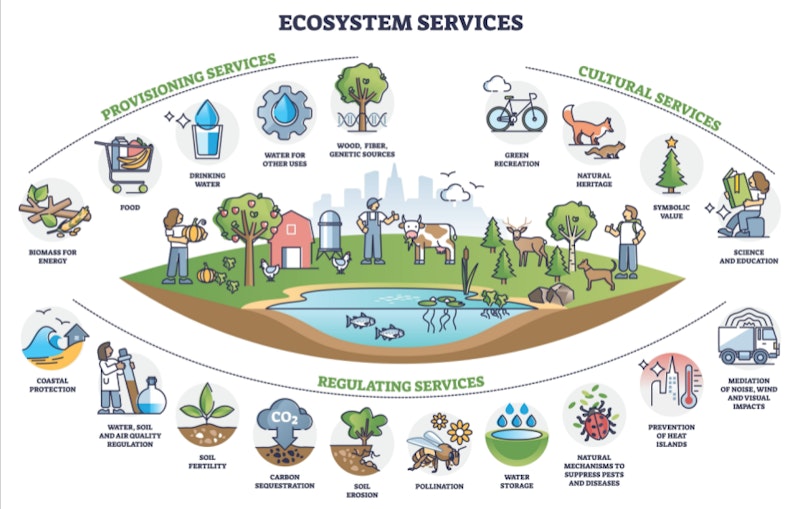Study Notes
GCSE Geography | Why are Ecosystems Important? (Ecosystems 2)
- Level:
- GCSE
- Board:
- AQA, Edexcel, OCR, Eduqas
Last updated 17 Oct 2024
Ecosystems are important of a variety of reasons - they provide us with a range of goods and services.

Provision of goods
Ecosystems provide biomass for energy - where wood, plants or other organic matter such as manure, is burned to create heat or be converted into electricity. Biomass is a renewable source of energy, however it does release carbon dioxide when burned, but much less than burning fossil fuels releases.
They also provide drinking water and water for domestic, agricultural and industrial uses, as well as food for humans and animals.
Additionally, ecosystems provide goods such as timber that can be sold and used in construction or to make furniture, which has a large economic benefit.
Finally, ecosystems provide many ingredients for medicines, as well as countless products such as toiletries, household chemicals and oils used in cooking.
Facilities for leisure and culture
Ecosystems provide important green spaces for leisure and recreation, such as lakes for water sports, woodlands for walking, which are essential for physical and mental well-being.
Ecosystems provide natural heritage - such as beautiful landscapes which are important wildlife habitats. These can be given protected status, such as nature reserves or national parks, leading to opportunities with tourism that can boost the local economy.
Finally, ecosystems are important for science and education, in terms of conservation and learning about things such as the impact of climate change, or loss of biodiversity.
Regulating services
- Coastal protection - for example, mangrove forests protect coastal zones from strong winds, storm surges and flooding. The tree roots act as buffers, slowing the flow of the tidal waters, which allows sediment to settle and build up as nutrient-rich mud, providing shelter and breeding sites for fish.
- Regulation of water, soil and air quality - plants act as a filter, removing pollutants from them.
- Soil fertility - ecosystems provide leaf litter for nutrient cycling, which returns nutrients back to the soil, to be taken up through roots to encourage plant growth.
- Carbon storage - plants are important stores for carbon dioxide - they take in carbon which is used in photosynthesis, and release oxygen. Natural carbon stores are important in the fight against climate change.
- Reduces soil erosion - plant roots bind the soil together to stop it being blown away by strong winds, or washed away by heavy rains. Decomposing leaf litter also stops the soil from drying out so much so it is less vulnerable to soil erosion.
- Pollination - to reproduce a plant needs to be fertilised with pollen from another plant of the same type, and pollen is moved from plant to plant by pollinating animals (eg. bees and butterflies) or the wind. Ecosystems encourage pollinators.
- Water storage - water is stored in ground surfaces, such as ponds and lakes, but also in plants in leaves, branches and trunks.
- Disease and pest suppressant - ecosystems have natural mechanisms to suppress pests and diseases, reducing the need for chemical solutions which harm habitats.
- Prevention of urban heat islands - natural vegetation provides shade and absorbs less heat than concrete or tarmac surfaces, and also releases moisture back into the atmosphere through the process of transpiration - this is why built up areas are often warmer than the surrounding countryside.
- Softening visual impact - natural ecosystems soften the noise and visual impact of things, like motorways and trunk roads, as well as new housing developments, and they also act as a natural wind break.
You might also like
Ecosystem Succession
Study Notes

Unsustainable growth degrades Asia's land
8th October 2015
Marine protected area to be created off Scotland
9th June 2019
How to choose which species to save
28th December 2019
Ecosystems - GCSE MCQ Quiz
Quizzes & Activities

Hopeful Geographies 2: ‘Joined Up’ Conservation Works in Southern Africa
10th January 2024
Daily Email Updates
Subscribe to our daily digest and get the day’s content delivered fresh to your inbox every morning at 7am.
Signup for emails